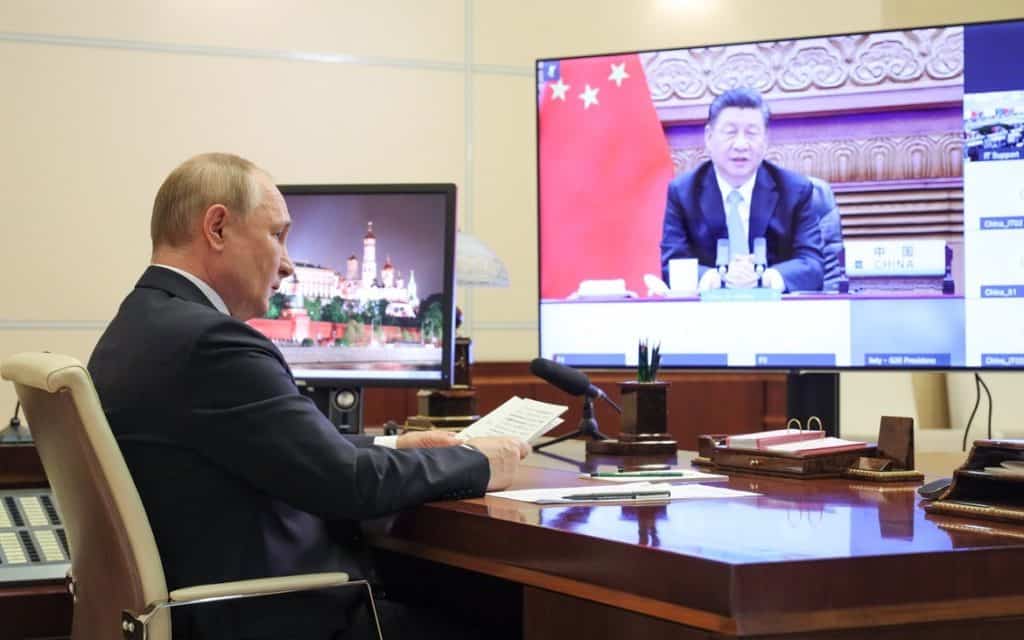World Geostrategic Insights interview with Alexei D. Voskressenski on prospects and challenges for a Greater Eurasian Partnership, the development of Sino-Russian relationship, and models of democracy distinct from the Western one.
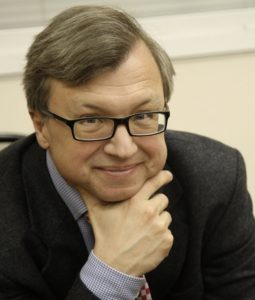
Alexei D. Voskressenski is Professor, Dr.Pol.Sc., Ph.D. (Government), PhD (History of International Relations and Foreign Policy), and Director of the University Center for Comprehensive Chinese Studies and Regional Projects at the Moscow State Institute of International Relations (MGIMO). He is the author of numerous books, published in many countries, and TV commentator on international politics.
-At the St. Petersburg International Economic Forum, held June 15-18, issues related to the development and strengthening of the economic partnership of the Eurasian space were discussed in depth. It was emphasized that the economies of Eurasia are facing some major challenges: inflationary risks, food and energy security issues, climate agenda, technological transformations and growing geopolitical tensions. And that the daunting tasks currently facing Eurasian countries and businesses must be solved by reformulating the traditional institutions of international trade and finance on which the global economy has relied for decades. Accordingly, has been underlined that this new reality reinforces the importance of the creation of the Greater Eurasian Partnership composed of separate sub regional partnerships, similar to building blocks of a future pan-Eurasian structure, based on the common interests of its participants and each other’s technological, logistical and infrastructure. Also at the Eurasian Economic Forum, held in Bishkek last May, Russian President Putin emphasized the importance of greater integration of the Eurasian Union and referred to the “Greater Eurasian Partnership” as a project that looks increasingly eastward and envisions trade cooperation with major Asian areas and organizations to change the political and economic architecture, and become a guarantor of stability and prosperity for the entire continent. The term “Greater Eurasia” however, does not seem to be a single concept, but rather a broad conceptual framework encompassing geopolitical, geo-economic and geo-ideological thinking aimed, over time, at achieving an economic, political and cultural renaissance among Eurasian states, to become a global economic and political center. So, how can this project be defined, and what are the prospects and challenges for the creation and development of the Greater Eurasian Partnership?
First of all, it should be recognized that the St. Petersburg International Economic Forum is only one of the regional forums available to address the economic transformation of Eurasia, which has the Eurasian Economic Union (EEU) as its centerpiece. Others focus on security and defense issues, such as the Shanghai Cooperation Organization (SCO), and their structures and missions differ. Another, which is transregional in nature and has a broader geographic scope, is the BRICS forum (Brazil, Russia, India, China, South Africa), which also has supporting organizations (BRICS business, youth forum, etc.).
The Greater Eurasian Partnership, an “umbrella” idea that encompasses all tracks of regional integration, was mentioned by Russian President Vladimir Putin in Bishkek last May when he underlined the significance of greater integration on the Eurasian zone, first in relation to the EEU. After February 24, 2022, and the following wave of sanctions, from the EU and other countries, there is no other way for Russia but to turn the national economy eastward, increasingly envisioning closer trade cooperation with major Asian areas and organizations, to change the Western oriented political and economic architecture of the last 30 years.
Given recent geopolitical developments in Europe, it appears that Greater Eurasia, formerly hailed as a viable continental region spanning from Lisbon to Vladivostok, safe from military threats and hungry for economic integration, has crashed. Governments have reformulated their policies to make them more realistic as a result of global political and economic changes, and the concept of Greater Eurasia has been divided into three main tracks:
– EEU, a transregional economic core of Eurasia (something like a smaller EU) oriented to build an integrated economic space, aimed at a common market for goods and services;
– SCO, as an international regional security organization once fostered by the necessity to resolve former border issues between China and former republics of the USSR (Russia, Uzbekistan, Kazakhstan, Tadzhikistan and Kirgizia). SCO now consists of 12 states: China, India, Pakistan, Russia, a number of former Soviet republics now sovereign states plus a number of observer-states. The full participation of Iran as a member-state starting from September 2022 may make SCO a full-fledged international regional organization with economics following strengthened security.
– BRICS, aimed to raise a coordinated sound agenda, as the G7 states do at G20 meetings, to ensure broader consensus on most urgent issues of global nature.
So, we are witnessing the birth of a more detailed conceptual and practical framework encompassing geopolitical, geo-economic and geo-ideological thinking aimed over time at achieving an economic, political and cultural renaissance among Eurasian states to become a global economic and political center. It is not an exaggeration to say that this is something like a Eurasian dimension of differentiated integration in the EU, but is going separately and in other form, though conceptually in the same direction through emerging macro-regionalisms and macro-regionalization, as the new form of globalization aimed at heightening regional competitiveness of emerging Eurasian markets.
However, this is an optimistic side of the process since it is not fully matured, is undergoing stages of uncertainties and prone to further difficulties, global and regional challenges. Notwithstanding differences in seeing the regional picture (example – speech of President Tokayev in Bishkek etc.), it seems that the process is aimed nevertheless at finding some consensual points that can help not hinder economic development.
It is clear also that under present circumstances the goal of economic, political and cultural renaissance among Eurasian states, and especially to become a global economic and political center, may thus be postponed indefinitely being seen only by the next generation of Eurasians. It appears that economic life will be reorganized according to new principles, but it is still uncertain just what final result for the economic dimension may be in the long-run since violence, threats, blackmail, lies, “gray zone” tactics, or “salami slicing” politics kill any initiative without which regional and national economic revival is impossible. Sadly, this is going against prior regional trends and could have unforeseen effects for the entire region if not for the whole world.
–The agreement signed at the opening of the Olympic Games last Feb. 4, between Russia and China, states that the two countries intend to develop plans to develop the Eurasian area alongside the Silk Road, to promote greater interconnection between the Asia-Pacific and Eurasia regions. In this perspective, some decisions already made by the two countries take on strategic value because they could provide the infrastructure to establish a self-sufficient Eurasian “globalization.” For example, in addition to the indispensable communication routes, also the establishment of a payments system that would operate in parallel with the Swift system and replace it; the design and first experiments of a Chinese digital currency, that would replace (or be parallel to), the current official currencies; and the detachment (which has already almost taken place) of the two countries’ Internet network from the global one. How will these plans develop? Can we say that the intended result will be a Eurasian globalization partly different from the Western one? How can the Sino-Russian partnership be maintained and developed for a long time? In geo-economic terms, Russia’s Greater Eurasia and China’s One Belt, One Road could be the same thing?
The agreement signed Feb. 4 between Russia and China states among other goals an intention to develop plans for the Eurasian area alongside the Silk Road, to promote greater interconnection between the Asia-Pacific and Eurasia regions. It is not the first among such types of agreements that may be mentioned. There were strong incentives ‘inside’ Eurasian political elite, mostly Russian and Chinese, to foster economic development in Eurasia by the Russian-Chinese dirigiste way.
Some analysts have even made comparisons to past policies of ‘forced modernization’ exemplified by the Stalin period or by the Chinese ‘Great leap’ forward. To what extent the lessons of history are learned by the Eurasian political elites is not clear yet since no Stalin or Mao have fully seen the historical results of their policies. The new generation of younger Eurasians is not aware of the price that was paid for that. To turn historically back, to close countries to the open world will result in a further demographic, social, economic and technological degradation as it happened already in the past.
However, a pragmatic side in the ‘pivot to Asia’ is behind the policies of many states. It is clear that the Asia-Pacific is an amorphous geographic region. It has now several functional incarnations limited sub-regionally like ASEAN, the RCEP, and the Indo-Pacific. So, regional orders may compete as well as nations and states. A macro-region cemented by functional regionalism or/and transregionalist ties has high chances to become the center of geoeconomics activity for the next 5 to 10 years.
Geopolitical contests may follow or precede, bring more political will, capital and military resources of the great powers, but may as well result in a collapse, a catastrophe i.e., not necessarily in economic success. Our world is more fragile now because it is more complex and globalized. That means that while the ‘collective West’ (using Mr. Putin’s words) will be restructuring, or if using formulae of many Russian politicians and television analysts – while the West is in decline, Russia and China may lead Eurasian countries to gain economic and political dividends from the early joining the second Asia-Pacific rising as a major sophisticated non-Western market.
However, though the general trend is clear devil is in details: to be pressed or being obliged by politically or economically tying arrangements may not necessarily be a successful way to deal with complicated economic and political issues: there are already RCEP, QUAD, AUKUS with their broadening spheres of interests in the region. The ’pivot to the East’ proclaimed ten years ago is still not fully realized by many except by China which is expanding to all sides simultaneously. It is clear that the new communication routes in Eurasia are indispensable to build larger, competitive and maybe even more sophisticated markets. But is this process necessarily accompanied by the loans that countries could not repay as during colonialist times?
The establishment of a payments system that would operate in parallel with the Swift is a necessary precaution in the times of sanctions, but does the region really need a total replacement of the SWIFT to better compete globally? Both China and Russia are experimenting with a digital currency, but Chinese renminbi is not fully convertible and the convertibility of ruble is now extremely limited. Will digital currencies make economies necessarily stronger? Can the digital system be a warranty against fraud? Can a state and its various bodies through the hands of unscrupulous people initiate digital processes that the population may consider a fraud, like an exchange of banknotes in the Soviet past? And if digitalization makes some spheres of ordinary life more difficult or proceeds in the forms that makes the life of people with children or the elder generation, more difficult? Especially if those who do this are appointed and not accountable? Or if the election process is formal, not fair and not transparent? Can digitalization be a 100% guarantee of success if the economic climate is not business friendly or even malign to any spontaneous activity?
So, in politics a form may be as important as a content. In the case of Russia and the other Eurasian countries GDP being smaller than the GDP of one though maybe the most advanced Chinese province, what may be the price for the future generations to sacrifice now the regional multipolarity for the full dominance of yuan? Older generations of a post-Soviet space still remember a popular 1970-1980-ies Soviet anecdotic question: How much would vodka cost in 2020? And an answer: 10 yuan. What the younger Russians with a sovereignty proclaimed a new sacred value would think if the Soviet anecdote becomes true?
If a national Internet is fully detached from the international system, in all its segments and not just in those that must be secured by some reasons, will that raise a competitiveness of Russia if auto production in the country fell by 95-96% in two months and a new vice-premier was appointed recently to fight a new technological decay? Could a ‘sovereign Eurasian globalization’ survive and get possible national economic agents able to compete on a global level in the times of global interconnectedness and global supply, production and technological chains?
Even the largest world economy cannot afford complete self-sufficiency. Russia is now trying to copy China’s economic and even political model but the much more global China still became a member of RCEP and is eager to enter other newest world associations. As far as Russian and Chinese leaders proclaimed and what is following directly from the bilateral documents the EEU must be connected (sopryazhen) to China’s One Belt, One Road when economic and political interests of both sides coincide thus ensuring the cumulative economic effect. That means the needed consensus on many issues in order to proceed further on a par. Maybe this is a time now to separate a ‘cutlet from flies’ as once was said by a Russian politician using a colloquial metaphor? Common political goals proclaimed need adequate mechanisms elaborated on a multilateral basis. The existing Eurasian organizations may be such a tool if a political will exists to do this.
– Another point in the Russian-Chinese agreement, signed on the occasion of the Olympic Games, concerns the very conception of democracy. Basically, it states that democracy does not have universal value with an already defined form, but takes the forms of each country’s tradition, including its political and social system, and “any state and social arrangements derived from each country’s tradition” are assumed to be democratic. Thus, liberal democracy is no longer something distinctive or a model applicable to any country. Can you explain this concept in more detail?
The idea that only the population of a particular country may appraise the level of democracy may be biased for certain political reasons. Tradition is something that helps societies to accumulate civilizational experience of the past to survive in the times of unexpected changes or catastrophes. But tradition does not necessarily give humans a possibility to develop socially, politically or economically etc. For example, tradition may not necessarily defend us from the threat that did not exist in the past.
Answers to challenges like dangers of mass destruction, climate change, pandemic etc. can be given in two forms – based on practice or science. But we know from history that human civilizations can die because of many reasons. In recent years, substantial progress has been made in Social Sciences everywhere toward understanding what may be called successful governance. Democracy is still the best mechanism to correct inadequacy of any concrete forms of governance with lesser social consequences.
Today, it has become apparent that the theoretical explanation of contemporary global and international processes cannot be considered complete without a regional analysis, especially as concerns the non-Western regions of the world because globalization took a form of regionalization. The crux of the matter is that the issues facing Eurasian regionalization are not unique. Other regions and countries, Western and Eastern as well, faced such issues earlier, in the same ways or different order. And the ways of solving these problems, that are not unique taken separately, become unique in successful combinations for each country due to its specifics.
Whether the East to which Russia is more and more oriented politically is unique and successful in this regard is a complicated matter. What may prove useful from the experience of the East to Eurasia? What is it from the experience of other countries including the East that should be avoided at all cost? Answers are particularly important for understanding the uniqueness of each country, especially large ones, which may accelerate, but may also impede the development of a particular government, just as economically, so politically.
Regions as nations may also be more or less competitive. The Social Sciences are equipped now with methodology and mechanisms to make scientific appraisals on the quality of social and political processes in the whole world and regionally. The application of the experience of other nations and regions (social, political, economic engineering) may accelerate, but may also block or even reverse the evolution of certain parameters of development, particularly of its political and certain economic characteristics, that is, just as it may assist in modernization, so it can promote the archaization as well as modernization of politics and governance.
The developed countries of the West traveled the path to modernization and transformation from traditional to industrialized society and completed their transition to post-industrial societies. The experience of the countries of the West is important from the perspective of evaluating the concluding phase of this path in the given historical period of human development, but only a select few nations had succeeded in reproducing the specific path in its Western variant for the simple reason that it is impossible to step into the same river twice. Does that necessarily mean to negate Western experience? Other countries failed and will continue to fail to retrace any path due to differences in economic and political structures.
However, some of the countries of the East, which as a whole entered upon the path to modernization later than the West, succeeded in catching up, without any dislocations or mobilizations, having set the goal, but accomplishing it in a different, briefer way, one better corresponding to national specifics. Consequently, there exist various (successful, problematic, and unsuccessful) paths of modernization of the socio-economic and sociopolitical systems, which either achieve or fail to achieve the successful completion of this process. So, a political will may be only an important but not a sufficient prerequisite to achieve a proclaimed goal.
Those countries which managed to find their way based on their social legacy succeeded in maintaining their own cultural, civilizational specifics, having enriched the experience of global development, but accomplishing this so that the specifics ceased to impede development, catching up the upper tier of the world by life standards of the population i.e., economically, in social and political terms, and even in some cases managing to influence or even correct the path of global development.
Alexei D. Voskressenski – Professor Doctor of Political Science, Ph.D. (The University of Manchester, Government), PhD (Kandidat Nauk in History of International Relations and Foreign Policy, Institute of Far Eastern Studies). He directs the University Center for Comprehensive Chinese Studies and Regional Projects (MGIMO). Previously he was Dean, College of Political Affairs and World Politics and School of Political Science (2008-2017) at MGIMO, and is professor of Asian Studies, IR and Comparative Politics at the School of International Relations (MGIMO). He was founding editor-in-chief of the peer-reviewed journal “Comparative Politics Russia” and is author of numerous books published in many countries. He appears on TV commenting on international politics.
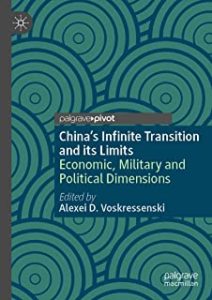 |
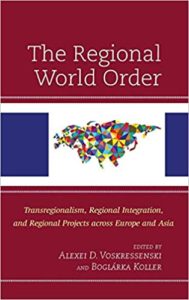 |
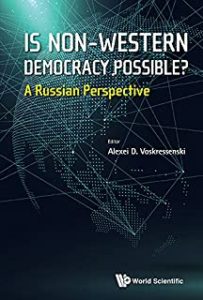 |
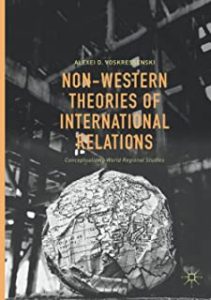 |







